
The men behind the Great Train Robbery
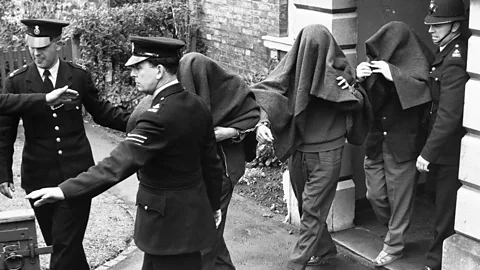 Getty Images
Getty ImagesBritain in the 1960s was captivated by the daring of the Great Train Robbery, and the sheer scale of the money stolen. But when the accused men stood trial in April 1964, the judge was determined to send a message that such crimes would not be tolerated. Fourteen years later, several of the convicts talked to the BBC.
On 16 April 1964, Robert Welch was one of the 12 men found guilty of a notorious heist in Aylesbury Crown Court. Fourteen years later, in 1978, he was on the BBC's documentary and current affairs programme, Man Alive, and recalled seeing local dignitaries jostle for positions in the courtroom to hear the sentencing. "This was what they had all come to watch. The climax of the play, the drama," Welch said. "And the medieval setting in which we were sentenced, you know, it was a bit chilling."
Welch and his fellow convicts had fallen a long way since pulling off one of the most audacious and lucrative thefts the UK had ever seen: the Great Train Robbery.
WATCH: The daring heist and huge sum of money captivated the British public.Welch and his co-defendants were part of a band who held up a Royal Mail night train travelling from Glasgow to London. The robbers had made off with £2.6m in used banknotes, a record haul at that time, and the equivalent of over £50m ($65.8m) today. At the time of Welch's trial, police were still hunting for three of the people they suspected had been involved in the crime.
To execute this carefully orchestrated robbery, 15 members of two of London's biggest criminal gangs had worked together, each tasked with a particular role in the plot. "They were regarded as the elite of the criminal world," Reginald Abbiss, who had covered the crime for the BBC as a young reporter, told the Witness History podcast in 2023. "You had to have a certain talent and audacity, certain abilities to be able to pull a heist of this magnitude and they came together because they needed a multitude of talent."
The daring robbery took place just after 03:00 on 8 August 1963. The first step the criminals had taken was to cut the phone lines to stop an alarm being raised. They then rigged the train signals to stay red. "They put a glove over the green light, they wired a cheap battery up to the red light and this, of course, meant the driver had to slow up," said Abbiss.
One of the robbers hit him on the head with a cosh. A lot of blood and down he went – Richard AbbissSeeing the red light, the train's driver, Jack Mills, stopped the engine, and his co-driver, David Whitby, climbed out to use the trackside phone to find out what the problem was. That's when Whitby discovered that the line had been cut, and he was set upon by masked men wearing boiler suits. In the meantime, a masked robber burst into the train's cab to restrain the driver. When Mills tried to put up a fight, another gang member hit him over the head, rendering him semi-conscious.
"The one glitch, if you like, was the fact that the train driver… tried to resist," said Abbiss. "One of the robbers hit him on the head with a cosh. A lot of blood and down he went."
The gang had been given inside information that the cash and high-value packages were held in the train's front two coaches. And because it was a Bank Holiday weekend, it would be carrying more money than usual.
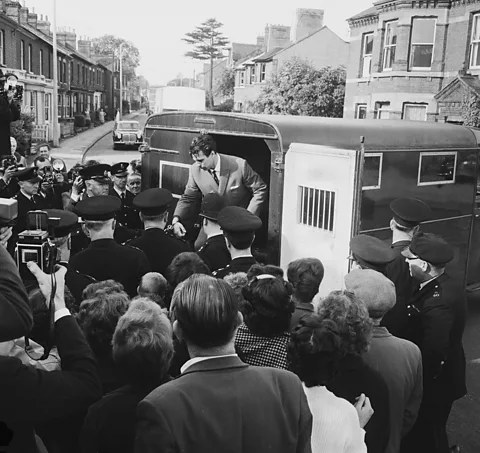 Getty ImagesDespite the meticulous nature of the robbery, within a year the majority of the gang had been rounded up and were facing trial (Credit: Getty Images)One hundred and twenty sacks of money
Getty ImagesDespite the meticulous nature of the robbery, within a year the majority of the gang had been rounded up and were facing trial (Credit: Getty Images)One hundred and twenty sacks of money Although there weren't any police onboard, there were more than 70 Post Office employees, mostly in the rear carriages, where they were busy sorting letters. The criminals who had already familiarised themselves with the train's operation and layout quickly uncoupled the two money-laden carriages. The plan was to detach them and drive them away from the steep embankment to a predetermined rendezvous where it would be easier to unload the bags of cash.
It was then they hit a problem. "They had a driver to drive the train, he couldn't get the train going, and they had to pull the original driver, Jack Mills, up from the floor and threaten him and say, 'Drive the train,'" said Abbiss. "He managed to get the train a mile up the line to where most of the gang were waiting, leaving the other eight or nine coaches with sorters happily sorting, totally unaware that the main part of the train had gone on ahead."
Mills, still bleeding profusely, was told to stop the two front carriages at Bridego Bridge. There, the rest of the gang broke into the carriages, overpowering the Post Office staff working in them, and forcing them to lie face down on the floor. They also brought in Mills and Whitby, who were handcuffed together.
WATCH: I couldn't think of anything but 30 years. When are we going to get out?
The gang had decided that they would give themselves just 15 minutes to unload the loot and then leave whatever money was left. They formed a human chain and swiftly removed 120 sacks containing two-and-a-half tonnes of money into parked Land Rovers. After a quarter of an hour, the crew called time and ordered the terrified Post Office staff to stay still and not to attempt to contact the police for 30 minutes. Then the robbers drove off into the night.
The boldness of the theft and the enormous sum of money involved captured the British public's imagination. In the weeks that followed, the country was gripped by sensational headlines detailing the police's hunt for the perpetrators. But despite the meticulous nature of the robbery's planning and its skilful execution, within a year the majority of the criminal gang had been rounded up and were facing trial.
"Well, at first view, the job was a very well-planned job," ex-Det Supt Malcolm Fewtrell, who led investigations into the heist, told BBC News in 1964. "But in the event, it has been a disaster. They obviously weren't so clever as they thought they were."
The judge at their trial did not view the robbers' actions in the "romantic" way some of the public seemed to, saying that it would be "positively evil" if he showed the convicted men any semblance of leniency.
Crime and punishment"I remember a shock wave ran through the courtroom when the judge, a man called Lord Justice Edmund Davies, handed down 307 years in the space of half an hour," Abbiss told BBC Witness History in 2023. At the time, the punishments they received for the robbery were some of the harshest in British criminal history, especially since nobody had been killed and no firearms had been used.
"I was just numbed, I couldn't think of anything but 30 years. When are we going to get out? We are never going to get out," one of the robbers, Tommy Wisbey, told Man Alive in 1978.
"I don't think it really hits you until a couple of days later and you realise what you've got," fellow gang member Gordon Goody said to the BBC. "I mean it was a bit of a joke downstairs, clowning around and all that kind of thing. But deep down, I suppose you were sick."
More like this:
• The British politician who was caught faking his own death
• The true story of The Great Escape
• The bizarre siege behind Stockholm Syndrome
The reason the judge gave for the severity of the prison terms was the assault on Mills. "Anybody who has seen that nerve-shattered engine driver can have no doubt of the terrifying effect on law-abiding citizens of a concerted assault by armed robbers," said Justice Davies at the trial. Mills never worked again and died in 1970 of leukaemia. His co-driver Whitby died of a heart attack the following year at the age of 34.
In History
In History is a series which uses the BBC's unique audio and video archive to explore historical events that still resonate today. Subscribe to the accompanying weekly newsletter.
But there was also a sense, at least among the robbers themselves, that they were being disproportionately punished because the heist had embarrassed the British establishment. One of them, Roy James, said to the BBC in 1978, "At that moment, all the shame that was with me throughout the trial was lifted because I felt that Mr Edmund Davies then used his position as a High Court judge, used the backing of the state for vengeance. He put himself on a par with me and everything that he said I was."
"There was a feeling that Justice Davies came down particularly hard for two reasons," said Abbiss. "One was the violence shown against the train driver, and the other was that the establishment, the government, the Post Office and British Rail, the way that they were sort of caught with their pants down. It showed the establishment to be people perhaps who take their eye off the ball."
The criminals' notoriety only grew following their sentencing when two of the gang made dramatic escapes from prison. Charles Wilson, who had been the treasurer of the group, broke out of jail just four months after the trial. He was recaptured in Canada after four years on the run and served another 10 years behind bars. Ronnie Biggs escaped from London's Wandsworth Prison, 15 months after his sentencing, using a makeshift rope ladder. He underwent plastic surgery and lived at times in Spain, Australia and Brazil, evading arrest for nearly 40 years. In 2001, he voluntarily returned to the UK for medical treatment and served the rest of his prison sentence.
On the runThe law would also eventually catch up with the three gang members who didn't stand trial that day. Bruce Reynolds, considered to be the robbery's mastermind, spent five years on the run until he was arrested on his return to England. He was sentenced to 25 years in jail, but ended up serving just 10. His son Nick, who spent his early life on the run with his father in Mexico and Canada, would later have his own link to the outlaw lifestyle when his band Alabama 3's song Woke Up This Morning became the opening theme of The Sopranos TV series.
Ronald "Buster" Edwards, who was later played by Genesis singer Phil Collins in a 1988 film, Buster, fled to Mexico following the robbery. He gave himself up in 1966 and was released after serving nine years. James White, who acted as the quartermaster for the robbery, was caught in Kent and sent to prison after three years on the run. He was released in 1975.
Despite the lengthy jail time handed down, all the men convicted of the Great Train Robbery would end up being released early. None served more than 13 years for the crime – although many of them would return to prison for different offences in the years that followed.
As for the huge haul stolen during the robbery, despite the police in 1964 offering a 10% share for information that would lead them to it, the majority of the money was never recovered.
--
For more stories and never-before-published radio scripts to your inbox, sign up to the In History newsletter, while The Essential List delivers a handpicked selection of features and insights twice a week.
For more Culture stories from the BBC, follow us on Facebook, X and Instagram.
In HistoryHistoryCrimeBritainFeaturesWatch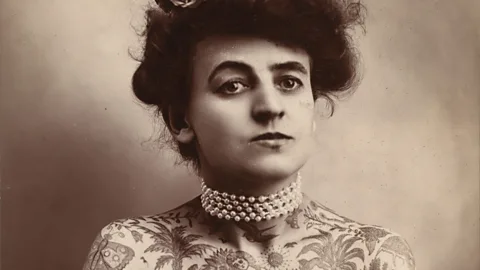 Why we're still talking about Maud Wagner
Why we're still talking about Maud WagnerHow America's first professional female tattooist broke through into an art form historically dominated by men.
4 Mar 2025History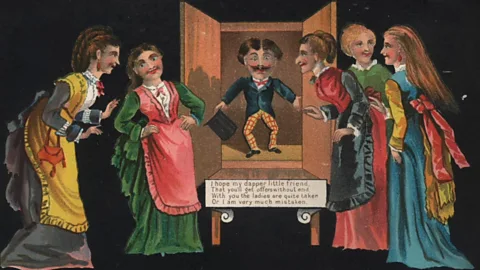 The insulting 'Vinegar Valentine' of Victorian England
The insulting 'Vinegar Valentine' of Victorian EnglandValentine’s Day is thought to celebrate romance but rude cards soured the holiday for its recipients.
14 Feb 2025History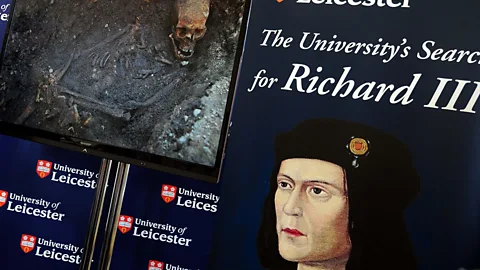 Richard III: The 'accidental' photo of a long-lost king
Richard III: The 'accidental' photo of a long-lost kingWhy a famous photograph of King Richard III's skeleton was a happy 'accident'.
11 Feb 2025History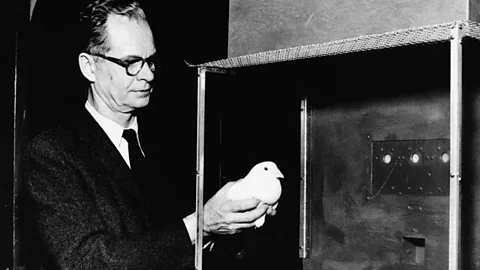 The WW2 experiment to make pigeon-guided missiles
The WW2 experiment to make pigeon-guided missilesAn unexpected WW2 experiment by behaviourist B F Skinner proved that pigeons could be used for missile guidance.
4 Feb 2025History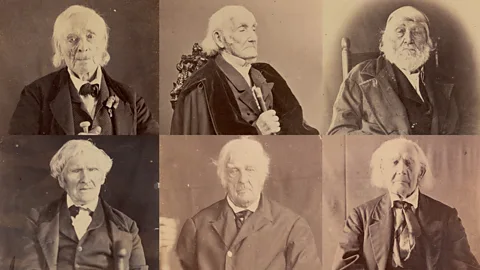 America's last Revolutionaries: Rare photos of US patriots
America's last Revolutionaries: Rare photos of US patriotsHow a dwindling group of veterans from the American War of Independence were featured in early photographic form.
7 Jan 2025History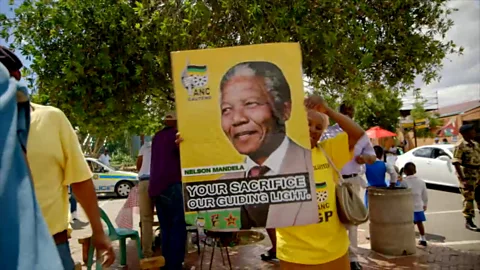 Idris Elba on moment he learned about Mandela's death
Idris Elba on moment he learned about Mandela's deathThe actor recalls being at the Mandela film premiere when he heard the anti-apartheid politician had died.
7 Dec 2024History Mary Mallon: 'The most dangerous woman in America'
Mary Mallon: 'The most dangerous woman in America'How Mary Mallon, an Irish cook for New York's elite, became known as the 'most dangerous woman in America'.
17 Nov 2024History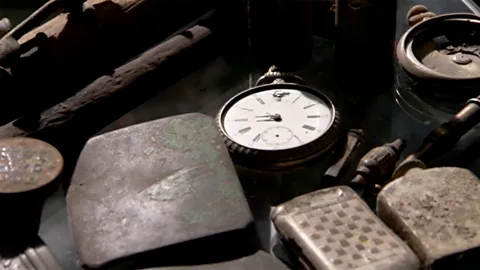 World War One relics live on in the fields of Europe
World War One relics live on in the fields of EuropeThe battlegrounds of World War One are still giving up their revealing evidence of bitter fighting.
12 Nov 2024History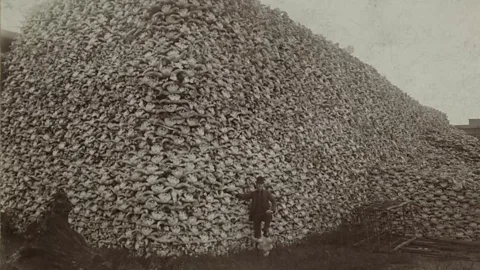 The picture that tells a lesser-known chapter of US history
The picture that tells a lesser-known chapter of US historyHow a 1892 photo from Rougeville, Michigan, became the most iconic image of the bison massacre in America.
22 Oct 2024History The history of swing states in the US
The history of swing states in the USThe US Presidential elections did not always depend on just these seven states.
21 Oct 2024History Why tonnes of mummified cats ended up in England
Why tonnes of mummified cats ended up in EnglandIn 1890 an estimated cargo of 180,000 ancient felines, weighing 19.5 tonnes, were auctioned off in Liverpool.
18 Sep 2024History Inside the ancient royal tomb found by accident
Inside the ancient royal tomb found by accidentThe Thracian Tomb of Kazanlak was accidentally discovered by Bulgarian soldiers digging up shelters in 1944.
11 Sep 2024Archaeology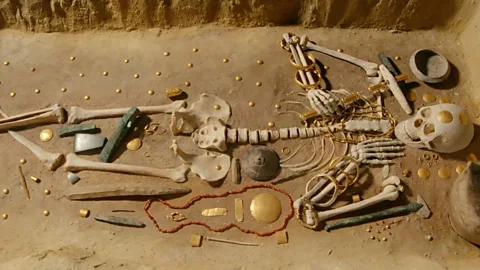 Varna Necropolis: World's oldest gold treasure
Varna Necropolis: World's oldest gold treasureThe Varna treasure is considered the world's oldest human processed gold, dating back 6,500 years.
10 Sep 2024Archaeology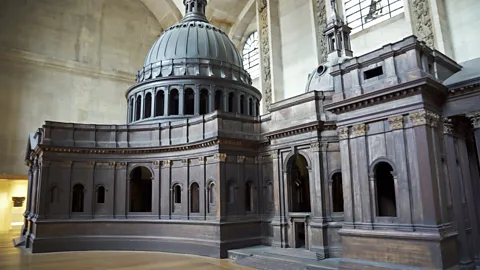 The giant 350-year-old model of St Paul's Cathedral
The giant 350-year-old model of St Paul's CathedralHiding in a London cathedral is an intricate wooden mock-up of Sir Christopher Wren's masterpiece.
5 Sep 2024History Uncovering the sunken relics of an ancient city
Uncovering the sunken relics of an ancient cityBettany Hughes goes underwater in search of ancient archaeological finds in historic Sozopol, Bulgaria.
4 Sep 2024Archaeology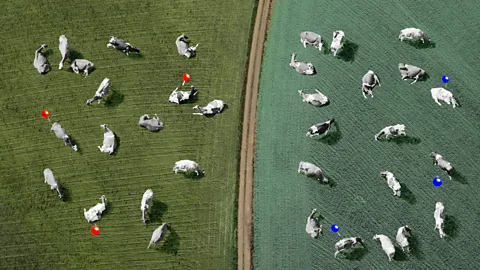 Texas fever: The lesser-known history of the US border
Texas fever: The lesser-known history of the US borderIn 1911, a fence was constructed on the US-Mexico border. But its purpose was not to stop humans.
18 Aug 2024History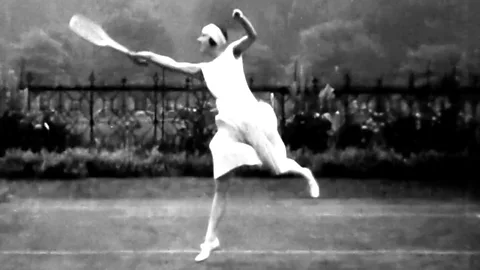 Century-old Olympics footage brought back to life
Century-old Olympics footage brought back to lifeA look through footage from the Paris 1924 Olympics gives viewers a chance to reflect on how much has changed.
9 Aug 2024Sport The rare medieval street about to reveal its secrets
The rare medieval street about to reveal its secretsOne of Europe's oldest residential streets hides in the heart of the English countryside.
23 Jul 2024History Tutankhamun: The first ever view inside the tomb
Tutankhamun: The first ever view inside the tombOne month after the famous discovery, photographer Harry Burton recreated the first view of Tutankhamun's tomb.
5 Jul 2024History Listen to the oldest known recording of a human voice
Listen to the oldest known recording of a human voiceThomas Edison wasn't the first person to record sound. It was a Frenchman who invented sound recording in 1857.
3 Jul 2024HistoryMore10 hrs ago Eating at the biggest water fight in the world
Eating at the biggest water fight in the worldThe sweltering heat during Buddhist New Year calls for Thailand's cooling khao chae, a fragrant and refreshing bowl of rice delicately scented with flowers.
10 hrs agoTravel10 hrs ago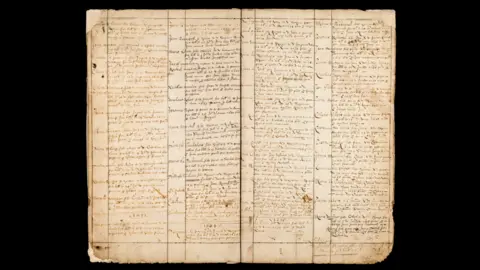 Millions of family history records move online
Millions of family history records move onlineThe project has been hailed as a "major achievement" by archivists on the island.
10 hrs agoGuernsey13 hrs ago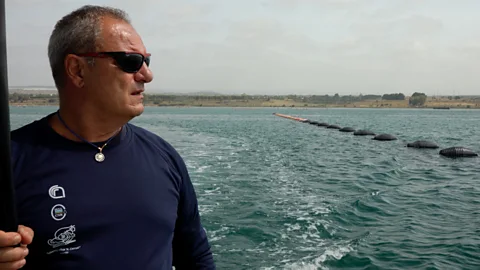 Saving Italy's polluted sea
Saving Italy's polluted seaDecades of industrialisation have polluted the waters of Italy's Mar Piccolo and brought mussel farming to its knees. Can plants bring back a traditional way of life?
13 hrs agoFuture1 day ago The world's biggest water fight
The world's biggest water fightFor three days every year, Thailand transforms into a wet and wild party. But this ancient festival is far more than just a raucous good time.
1 day agoTravel1 day ago Warfare review: 'A bold marvel of a film'
Warfare review: 'A bold marvel of a film'In his latest film Warfare, which stars Will Poulter, Cosmo Jarvis and Charles Melton, Alex Garland turns his gaze towards the ferocity of combat.
1 day agoCultureAP by OMG
Asian-Promotions.com |
Buy More, Pay Less | Anywhere in Asia
Shop Smarter on AP Today | FREE Product Samples, Latest
Discounts, Deals, Coupon Codes & Promotions | Direct Brand Updates every
second | Every Shopper’s Dream!
Asian-Promotions.com or AP lets you buy more and pay less
anywhere in Asia. Shop Smarter on AP Today. Sign-up for FREE Product Samples,
Latest Discounts, Deals, Coupon Codes & Promotions. With Direct Brand
Updates every second, AP is Every Shopper’s Dream come true! Stretch your
dollar now with AP. Start saving today!
Originally posted on: https://www.bbc.com/culture/article/20250410-the-men-behind-the-great-train-robbery?ocid=global_culture_rss
